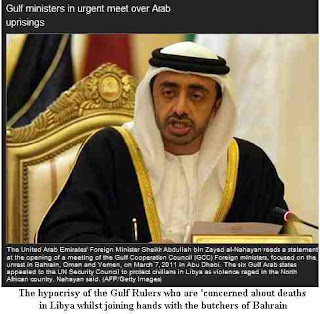
Hamas, as a petit-bourgeois movement, whose belief in ‘Sharia law’ is a code for support for capitalism and medieval social relics, is thus unable to break from the politics of the Arab regimes.
That is why it sought to prevent demonstrations against Mubarak at first because they had no confidence in the Egyptian masses and feared the wrath of Mubarak, since his regime allowed the tunnels and the tunnel mafia they spawned.
And of course the Syrian regime is widely believed to allow shipments of weapons to Hizbollah in Lebanon, a key ally. This dependence on Arab regimes, complicated by the non-Arab Iranian regime and its alliances, with Syria and Hizbollah, have forced Hamas into uncomfortable dilemmas which Tammimi only touches upon.
As he shows the region’s ‘only democracy’ has not at all been enthusiastic about what has been happening. It is difficult to imagine why this could be the case!
But the analysis in the article is well worth reading.
Tony Greenstein
The Guardian, Monday 2 May 2011
When, at the start of this year, Palestinians around the world marked the anniversary of the 2008-09 Israeli war on Gaza, few could see any hope. The Gaza Strip was still under siege, Palestinian reconciliation seemed out of reach, the Arabs were useless and the US unable, or unwilling, to broker a resumption of negotiations between Israel and the Palestine National
Authority (PNA).
Then came the Arab popular revolutions, and the mood among Palestinians switched from desperation to euphoria. Soon after the fall of Hosni Mubarak I visited my old friend, the Hamas leader Khalid Mish’al, in Damascus. He told me he was sure the change in Egypt, which he expected would be followed by similar changes in other Arab countries, meant that it would not be too long before Palestine was free.
My friends in Gaza would tell me the same thing, and so would my relatives in Hebron and the diaspora. They all believed that the Mubarak regime was an impediment to the Palestinian struggle for freedom; once the Egyptian people were free, a genuine democracy in Egypt would support the Palestinians.
At the very least, in the short term, Palestinians believed that post-Mubarak Egypt would not take part in the siege of Gaza, which would all but collapse if Egypt were to open the Rafah crossing between Sinai and the Gaza Strip. Indeed, last Friday Egyptian foreign minister Nabil al-Arabi told al-Jazeera that, within seven to 10 days, steps will be taken to alleviate the “blockade and suffering of the Palestinian nation”.
Palestinians monitored the Israeli reaction to the collapse of the Mubarak regime. It did not surprise them to see Israel immensely worried. Mubarak was an ally who contributed to Israel’s security in a very hostile Middle East. The neutralisation of Egypt, and the minimisation of its role in the Palestinian cause since President Anwar Sadat signed the Camp David peace treaty with Israel in 1978, constituted Zionism’s greatest success since Israel was created 30 years earlier. Rather than spearhead the struggle to liberate Palestine, Mubarak’s Egypt led the so-called Arab moderate camp, an alliance of pro-Israel and pro-US Arab states that included Tunisia, Saudi Arabia, Jordan, Morocco, the PNA and the United Arab Emirates.
Palestinians began to imagine what would happen if a popular revolution in Jordan were to bring about a similar change; then one in Saudi Arabia; and perhaps Morocco. Israel would have lost its most important allies in the region and the PNA would be isolated, having been fatally wounded by revelations in al-Jazeera and the Guardian about the concessions its negotiating teams offered in secret to the Israelis.
But although the Tunisian and Egyptian revolutions did inspire Arabs to demand political reform or regime change, it was not Jordan, Morocco or Saudi Arabia that saw this the most. There were a few demonstrations, but demands were generally for political reform rather than a change of regime. Instead it was Yemen, Libya and Syria that witnessed the more dramatic
protests, which soon escalated into armed struggle in Libya and calls for regime change in Yemen and Syria.
When I saw Khalid Mish’al in February, he did not expect a popular uprising in Syria. He believed the regime was less vulnerable because of its support for resistance in Lebanon and Palestine, as well as its anti-imperialist stance. But solidarity with the Palestinian or Lebanese resistance was not enough to protect any autocratic regime. This worried some Palestinians, and
they rushed to express support for Bashar al-Assad’s regime; but Hamas remained silent, to the regime’s displeasure.
While the euphoria created by the Tunisian and Egyptian revolutions has been dampened by the Libyan experience, seen by many in the Arab region as a revolution gone drastically wrong as a result of armament and western intervention, most Palestinians still believe a new era is coming. The more Arab dictatorships that are replaced by genuine democracies, the closer Palestine will be to liberation. Democracies representing the will of the Arab peoples can only be anti-Israel and pro-Palestinian.
One immediate fruit of Mubarak’s removal and the uprising in Syria has been the revival of Palestinian reconciliation efforts. Responding to grassroots pressure, both Hamas and Fatah met in Cairo and decided to work for the formation of a unity government and the resolution of disputes over security and elections. Fatah is anxious that it may lose favour with Egypt, while
Hamas is anxious it may soon lose Syria as a safe haven. Unsurprisingly, Israel threatened to take action against the PNA if Fatah went through with the deal with Hamas.
For many years Israel claimed to be the only democracy in the region. And yet Israeli politicians appealed to the US to intervene in Egypt to prevent Mubarak’s fall, and campaigned for him to remain in power. Israel clearly believes it can count on Arab dictators who are more interested in power and personal wealth than in serving their nations, let alone serving the Palestinian cause.
Despite its claims of superiority, Israel appears to suffer from the same symptoms that plague Arab dictators; the failure to learn that they need to change before it is too late. It’s been too late for Mubarak, Zine al-Abidine Ben Ali, Assad, Muammar Gaddafi and Ali Abdullah Saleh. Israel
has oppressed the Palestinians for so long, and has incurred the wrath of the Arab masses whose revolutions are bringing hope to Palestinians.
Whichever way one looks at it, the Arab revolutions are the best news the Palestinians have had for decades.
